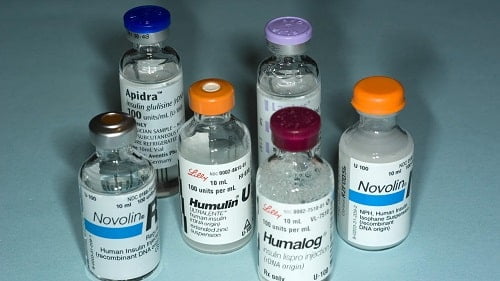One way to treat diabetes is to take insulin. There are five types of insulin, which differ in terms of their onset (how fast they work), peak (how long it takes to reach their full effect) and duration (how long they remain in your body).
The kind of insulin you take will depend on many factors—such as, your body’s reaction to insulin, your age, your diet, your lifestyle (how often you check your blood sugar and how often you wish to take insulin). Your doctor or health care practitioner will decide which type of insulin is right for you, and your needs may change over the course of your treatment.
There are also different ways to administer insulin: via a pump, an injectable pen, or a small needle.
Types and Brands of Insulin Medications
Rapid-acting
Rapid-acting insulin goes by the brand names:
- Humalog (lispro)
- NovoLog (aspart)
- Apidra (glulisine)
Rapid-acting is different from short-acting insulin, and is often prescribed along with long-acting insulin. Rapid-acting insulin can be given right before and after meals to help regulate blood sugar levels while eating. It only takes 15 minutes to take effect, peaks after 30 to 90 minutes, and lasts between three and five hours.
Short-acting
Short-acting insulin goes by the brand names:
- Humulin R
- Novolin R
Short-acting is different from rapid-acting insulin, and is often prescribed with long-acting insulin. Short-acting insulin can be given 30 minutes to an hour before a meal to help control blood sugar levels. It takes 30 minutes to an hour to work, peaks two to four hours later, and lasts three to eight hours.
Intermediate-acting
Intermediate-acting insulin goes by the brand names:
- Humulin N (NPH)
- Novolin N (NPH)
It can be taken twice a day and used in combination with short-acting insulin or rapid-acting insulin to help control blood sugar levels. Depending on the brand, it can be used overnight since it generally lasts between 12 and 18 hours. It takes between one and four hours to work, and peaks 4 to 12 hours later.
Long-acting
Long-acting insulin goes by the brand names:
- Lantus (glargine)
- Levemir (detemir)
- Toujeo (glargine)
- Tresiba (degludec)
Long-acting insulin is also known as basal or background insulin because instead of peaking like short- or rapid-acting insulin, they work throughout the entire day to keep blood sugar levels regulated. They can be combined, if necessary, with short-acting insulin before meals or to lower spikes in blood sugar.
Long-acting insulin lasts for an entire day and can be taken at bedtime. It takes one hour to work, and lasts between 20 to 26 hours. The injection insulins Toujeo (glargine), and Tresiba (degludec) are known as ultra long-acting insulin because they last between 24 and 42 hours. They take up to six hours to work, and you may experience a small peak with this type of insulin.
Lantus and Toujeo have slightly different formula concentrations, even though they are made by the same manufacturer, and should not taken interchangeably. Your doctor may need to adjust your dosage depending which long-acting insulin you take.
Pre-mixed
Pre-mixed insulin is a combination of short- and intermediate-acting insulin. It can be taken 10 minutes to 30 minutes twice a day before meals. It takes five to 60 minutes to work, and lasts between 10 to 16 hours. Peak times vary depending on the brand.
Doctor’s Recommendation
Insulin is produced to balance blood glucose levels. It also helps break down fats and proteins for energy. Maintaining precise insulin levels is essential for regulating blood sugar and overall body functions. Imbalances—whether too low or too high—can cause symptoms linked to abnormal blood sugar levels. Prolonged fluctuations in blood sugar can lead to serious health issues.
Disclaimer: Please note that the contents of this community article are strictly for informational purposes and should not be considered as medical advice. This article, and other community articles, are not written or reviewed for medical validity by Canadian Insulin or its staff. All views and opinions expressed by the contributing authors are not endorsed by Canadian Insulin. Always consult a medical professional for medical advice, diagnosis, and treatment.



